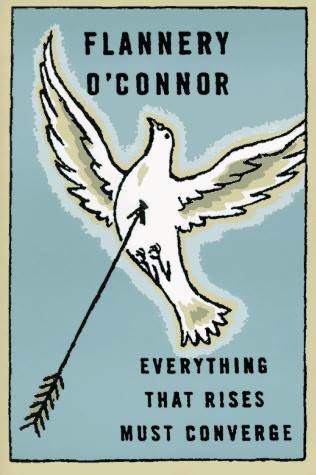 In 1964, Flannery O'Connor succumbed to lupus, the same disease that had killed her father. She was 39 years old. A year later, her final collection of short stories was published, revealing that the promise she had shown in her original collection (A Good Man is Hard to Find) had come to pass, and cementing her place as one of the greatest American writers of the 20th century.
In 1964, Flannery O'Connor succumbed to lupus, the same disease that had killed her father. She was 39 years old. A year later, her final collection of short stories was published, revealing that the promise she had shown in her original collection (A Good Man is Hard to Find) had come to pass, and cementing her place as one of the greatest American writers of the 20th century.The Plot:
As with A Good Man is Hard to Find, O'Connor's stories center on people living in the rural South. All of them consider themselves to be above others in one way or another (blacks, "white trash", etc). But in each story, the main characters have a powerful, and oftentimes violent, encounter with God and his grace.
My Review (Caution-Spoilers):
Though I would have to say that A Good Man is Hard to Find is the best introduction to the works of Flannery O'Connor, I would also have to say that Everything That Rises Must Converge is the better collection. O'Connor's growth as a writer between the two collections is very evident. Her writing is tighter and her themes more consistent in ETRMC. I'm not sure whether O'Connor's writing was easier to understand in this collection, or whether I was simply more familiar with it (probably a combination of both).
There are many themes that O'Connor tackles in this collection, but the most prevalent is the theme of divine grace. In almost every story, we have a character who seems to be, both to the reader and themselves, better than those around them. They are basically good people who go out of there way to "help" others. But as the story progresses, O'Connor begins to peel away the mask, revealing characters that are deeply flawed and in desperate need of the grace of God. And the reception of that grace is often represented in interesting ways: the goring of a woman by a bull (Greenleaf), the rebukes of a Jesuit priest (The Enduring Chill), the attack of an violent and ugly girl (Revelation). This is where many readers, especially Christian readers, find their problems with O'Connor. It all seems too dark and gruesome. But that is exactly what O'Connor wants to tell us. That divine grace is not sweet and peaceful, but violent and cutting. It actually reminds me of Lewis' The Voyage of the Dawn Treader, when Eustace is changed back from a dragon to a boy: "'The first tear he made was so deep that I thought it had gone right into my heart. And when he began pulling the skin off, it hurt worse than anything I've ever felt. The only thing that made me able to bear it was just the pleasure of feeling the stuff peel off.'" Yes, grace is painful, but with the pain comes redemption, beauty, and pleasure.
O'Connor gives the South the same treatment that she does her characters. The mask of nostalgia and sentiment is peeled away to reveal the flaws of our culture. The ugliness of such flaws as racism are pulled to the forefront and the South cannot ignore them.
Though all of the stories are well written, there were one or two that really stood out to me. The Enduring Chill was great with it's snobby main character who soon gets brought down a peg. I also liked The Lame Shall Enter First with it's heartbreaking yet beautiful ending.
Though only nine stories in length, Everything That Rises Must Converge is a compelling collection that Christians and non-Christians alike can appreciate. If you read and enjoyed A Good Man is Hard to Find, then this is definitely for you.
For more on the writings of Flannery O'Connor, including essays on many of her works, go to this website.
















No comments:
Post a Comment